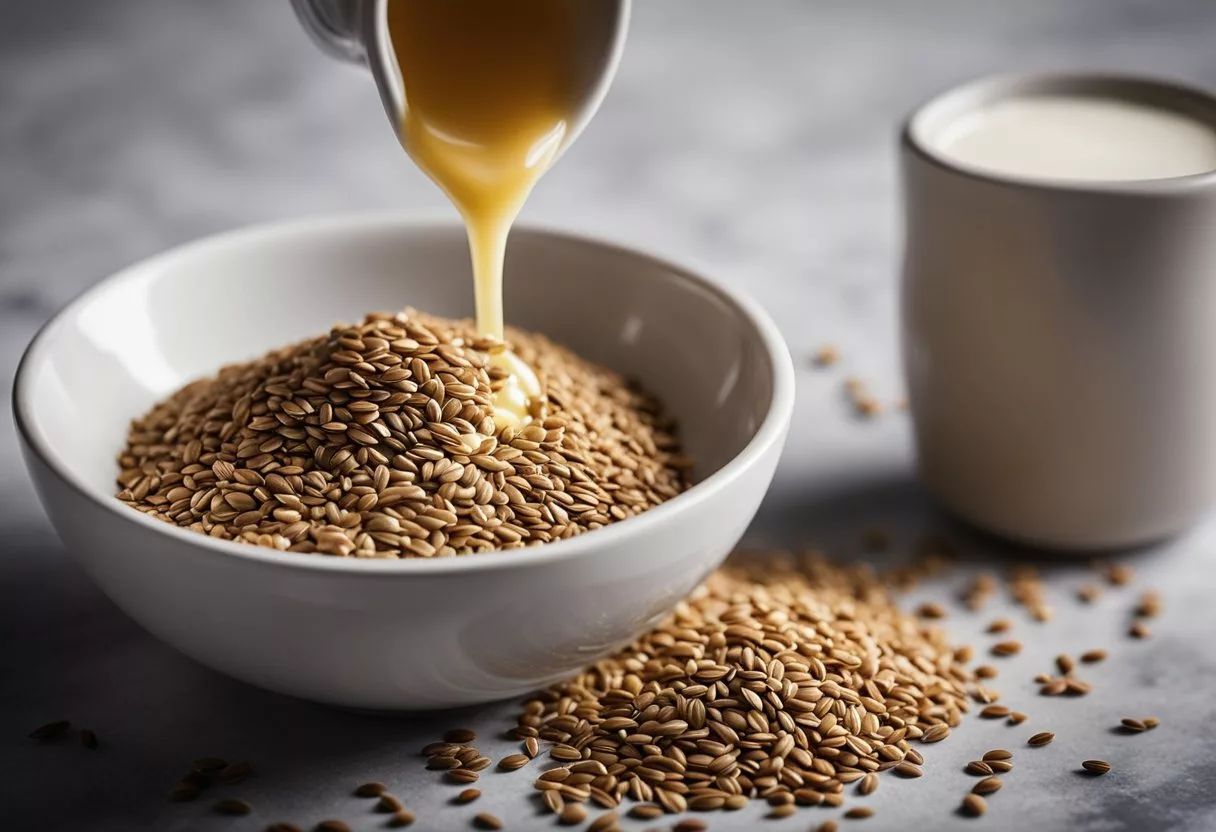Eating flaxseed every day can have a multitude of health benefits. Flaxseed is a tiny, golden or brown-colored seed that is a great source of fiber, omega-3 fatty acids, and lignans. These nutrients make flaxseed a great addition to any diet, and can help improve overall health and wellness.

One of the most notable health benefits of eating flaxseed every day is its ability to lower cholesterol levels. The fiber and omega-3 fatty acids found in flaxseed can help reduce LDL (bad) cholesterol levels, which can help reduce the risk of heart disease. Flaxseed may also help improve blood sugar control, making it a great addition to the diet of those with diabetes.
In addition to its cholesterol-lowering and blood sugar-regulating abilities, flaxseed may also have anti-inflammatory properties and may help reduce the risk of certain types of cancer. Overall, adding flaxseed to your diet can have numerous health benefits and is a simple and easy way to improve your overall wellness.
Nutritional Profile of Flaxseed

Flaxseed is a tiny, brown or golden-colored seed that is a rich source of nutrients. It is a good source of protein, fiber, omega-3 fatty acids, vitamins, minerals, and antioxidants. In this section, we will explore the various nutrients found in flaxseed and their potential health benefits.
Omega-3 Fatty Acids and ALA
Flaxseed is one of the best plant-based sources of omega-3 fatty acids, particularly alpha-linolenic acid (ALA). Omega-3 fatty acids are essential fatty acids that our body cannot produce on its own, and therefore, we need to obtain them from our diet. ALA is converted into EPA and DHA, the two most important omega-3 fatty acids that are found in fish oil. While the conversion rate of ALA to EPA and DHA is low, consuming flaxseed regularly can still provide some health benefits. Omega-3 fatty acids have been shown to reduce inflammation, lower blood pressure, improve brain function, and reduce the risk of heart disease.
Fiber Content
Flaxseed is a good source of both soluble and insoluble fiber. Soluble fiber dissolves in water and forms a gel-like substance in the gut, which helps to slow down digestion and keep us feeling full for longer. Insoluble fiber, on the other hand, adds bulk to the stool and helps to promote regular bowel movements. Consuming flaxseed regularly can help to improve digestive health, reduce cholesterol levels, and lower the risk of certain types of cancer.
Protein and Minerals
Flaxseed is also a good source of plant-based protein, with about 20% of its weight made up of protein. It is also a rich source of minerals such as magnesium, phosphorus, and copper. These minerals are important for maintaining strong bones, healthy blood vessels, and a healthy immune system.
Vitamins and Antioxidants
Flaxseed is a good source of several vitamins, including thiamin, niacin, and vitamin B6. It is also a rich source of antioxidants such as lignans, which are phytoestrogens that have been shown to have anti-cancer properties. Consuming flaxseed regularly can help to reduce inflammation, lower the risk of chronic diseases, and improve overall health.
In summary, flaxseed is a nutrient-dense food that can provide a range of health benefits. It is a good source of protein, fiber, omega-3 fatty acids, vitamins, minerals, and antioxidants. By incorporating flaxseed into your diet, you can help to improve digestive health, lower cholesterol levels, reduce inflammation, and lower the risk of chronic diseases.
Digestive Health Improvements

Flaxseed is a great source of fiber, which is essential for maintaining good digestive health. The fiber in flaxseed can help improve bowel movements, reduce bloating and constipation, and positively impact the gut microbiota.
Enhancing Bowel Movements
Flaxseed is high in insoluble fiber, which adds bulk to the stool and helps it pass through the intestines more easily. This can help prevent constipation and promote regular bowel movements. In addition, the soluble fiber in flaxseed can create a gel-like substance in the intestines, which can help regulate bowel movements and prevent diarrhea.
Reducing Bloating and Constipation
Flaxseed can also help reduce bloating and constipation. The soluble fiber in flaxseed can help absorb water in the digestive tract, which can help soften the stool and make it easier to pass. This can help reduce bloating and discomfort associated with constipation.
Impact on Microbiota
The fiber in flaxseed can also have a positive impact on the gut microbiota. The gut microbiota is a collection of microorganisms that live in the intestines and play a crucial role in digestive health. The fiber in flaxseed can help feed the beneficial bacteria in the gut, which can help improve overall digestive health.
In conclusion, incorporating flaxseed into your diet can have numerous benefits for digestive health. Its high fiber content can help regulate bowel movements, reduce bloating and constipation, and positively impact the gut microbiota.
Cardiovascular Benefits

Lowering Blood Pressure
Flaxseed has been shown to have a positive effect on blood pressure. According to a study published in the Journal of Nutrition, consuming flaxseed daily for six months significantly reduced systolic and diastolic blood pressure in people with hypertension. This effect is likely due to the high levels of alpha-linolenic acid (ALA), an omega-3 fatty acid found in flaxseed, which has been shown to have a beneficial effect on blood pressure.
Reducing Cholesterol Levels
Flaxseed has been shown to have a positive effect on cholesterol levels. According to a study published in the Journal of Cardiovascular Pharmacology, consuming flaxseed daily for six months significantly reduced total cholesterol, LDL cholesterol, and triglycerides in people with high cholesterol. This effect is likely due to the high levels of ALA found in flaxseed, which has been shown to have a beneficial effect on cholesterol levels.
Preventing Heart Disease
Flaxseed has been shown to have a positive effect on heart health. According to a study published in the American Journal of Clinical Nutrition, consuming flaxseed daily for six months significantly reduced the risk of heart disease in people with high cholesterol. This effect is likely due to the high levels of ALA found in flaxseed, which has been shown to have a beneficial effect on heart health by reducing inflammation and improving the function of blood vessels.
In summary, consuming flaxseed daily can have a positive effect on cardiovascular health by lowering blood pressure, reducing cholesterol levels, and preventing heart disease. These effects are likely due to the high levels of ALA found in flaxseed, which has been shown to have a beneficial effect on blood vessels and overall heart health.
Weight Management and Metabolism

Flaxseed is a popular food item that is known for its various health benefits. One of the most significant benefits of consuming flaxseed daily is its potential impact on weight management and metabolism.
Appetite Suppression
Flaxseed is high in fiber and protein, which can help to reduce appetite and promote feelings of fullness. When consumed, flaxseed swells up and forms a gel-like substance in the stomach, which can slow down the emptying of the stomach and increase feelings of satiety. This can help to reduce overall calorie intake and promote weight loss over time.
Caloric Impact
Flaxseed is also relatively low in calories, with one tablespoon containing only around 37 calories. This makes it a great food item to incorporate into a weight loss diet, as it can help to reduce overall calorie intake while still providing important nutrients and fiber.
Metabolic Enhancement
Flaxseed contains alpha-linolenic acid (ALA), an essential omega-3 fatty acid that has been shown to have a positive impact on metabolic health. ALA can help to reduce inflammation in the body, which can improve insulin sensitivity and promote weight loss. Additionally, some studies have suggested that consuming flaxseed can help to boost metabolism, which can lead to increased calorie burning and weight loss over time.
In conclusion, incorporating flaxseed into a healthy diet can have a positive impact on weight management and metabolism. By promoting feelings of fullness, reducing overall calorie intake, and improving metabolic health, flaxseed can be a valuable addition to any weight loss or weight management plan.
Cancer Risk Reduction

Flaxseed has been found to have potential benefits in reducing the risk of certain types of cancers, including breast, prostate, and colon cancer. The following subsections explore the evidence for each of these cancers.
Breast Cancer
Research has suggested that flaxseed may have a protective effect against breast cancer, which is thought to be due to its high content of lignans and phytoestrogens. Lignans are a type of phytoestrogen that can bind to estrogen receptors in the body and may help to reduce the levels of circulating estrogen, which is a hormone that can promote the growth of breast cancer cells. A study published in the Journal of Clinical Oncology found that women who consumed flaxseed had a 18% reduction in breast cancer risk compared to those who did not consume it.
Prostate Cancer
Flaxseed may also have a protective effect against prostate cancer, which is thought to be due to its high content of lignans and antioxidant properties. Lignans have been found to inhibit the growth of prostate cancer cells in laboratory studies, and a study published in the Journal of Urology found that men who consumed flaxseed had a 32% reduction in prostate cancer risk compared to those who did not consume it.
Colon Cancer
Flaxseed may also have a protective effect against colon cancer, which is thought to be due to its high content of fiber and lignans. Fiber is important for promoting regular bowel movements and preventing the buildup of toxins in the colon, which can contribute to the development of colon cancer. Lignans have also been found to have anti-cancer properties and may help to reduce inflammation in the colon.
In conclusion, while the evidence is not conclusive, flaxseed may have potential benefits in reducing the risk of certain types of cancers, including breast, prostate, and colon cancer. However, more research is needed to fully understand the mechanisms by which flaxseed may exert its anti-cancer effects.
Blood Sugar Regulation
Flaxseed may have beneficial effects on blood sugar regulation, making it a potentially useful food for those with type 2 diabetes.
Effects on Insulin Sensitivity
Insulin is a hormone that regulates blood sugar levels by allowing cells to absorb glucose from the bloodstream. Insulin resistance, a condition in which cells become less responsive to insulin, can lead to high blood sugar levels and type 2 diabetes.
Studies have shown that consuming flaxseed may improve insulin sensitivity, potentially reducing the risk of insulin resistance and type 2 diabetes [1].
Postprandial Glucose Control
Flaxseed may also help regulate blood sugar levels after meals. One study found that consuming flaxseed with a meal reduced postprandial glucose levels in people with type 2 diabetes [2].
Additionally, a review of 25 studies found that whole flaxseed may decrease blood sugar levels and improve glycemic control [3].
Overall, flaxseed may have beneficial effects on blood sugar regulation, making it a potentially useful food for those with type 2 diabetes. However, more research is needed to fully understand its effects and how it may be used as part of a diabetes management plan.
References:
- Flax Seeds and Flaxseed Oil for Diabetes: All You Need to Know – Healthline[1]
- Flaxseed and Diabetes: Pros and Cons – TheDiabetesCouncil.com[2]
- Flaxseed: 9 Health Benefits and How to Eat – Healthline[3]
Hormonal Balance and Women’s Health

Flaxseed is known to contain phytoestrogens, which are plant compounds that mimic estrogen in the body. These compounds can help regulate hormonal balance in women, particularly during menopause.
Menopausal Symptoms
During menopause, women experience a decrease in estrogen levels, which can cause a range of symptoms such as hot flashes, night sweats, and mood swings. Flaxseed consumption has been linked to a reduction in these symptoms due to its phytoestrogen content. One study found that women who consumed flaxseed daily for six weeks experienced a significant decrease in hot flashes compared to those who did not consume flaxseed.
Menstrual Health
Flaxseed may also benefit women’s menstrual health. The lignans in flaxseed have been shown to decrease the risk of breast cancer, which is linked to hormonal imbalances. Additionally, flaxseed may help regulate menstrual cycles and reduce symptoms of premenstrual syndrome (PMS).
It’s important to note that while flaxseed can help regulate hormonal balance, it should not be used as a substitute for medical treatment. Women with hormonal imbalances should consult with their healthcare provider before incorporating flaxseed into their diet.
Incorporating Flaxseed into Your Diet

Flaxseed is a versatile ingredient that can be easily incorporated into your diet. Whether you prefer ground or whole flaxseeds, there are a variety of ways to add this nutrient-dense food to your meals and snacks.
Ground vs. Whole Flaxseed
Ground flaxseed is easier for the body to digest and absorb, making it the preferred choice for many people. Whole flaxseeds can be difficult to digest, and they may pass through the digestive system undigested. However, whole flaxseeds can be a good option for those who prefer a crunchy texture or want to add them to baked goods.
Creative Culinary Uses
Flaxseed can be added to a variety of foods, including muffins, smoothies, baked goods, yogurt, salad, pancakes, oatmeal, cereal, and salad dressings. Here are a few creative ideas for incorporating flaxseed into your diet:
- Mix ground flaxseed into your pancake or waffle batter for a boost of fiber and omega-3 fatty acids.
- Add ground flaxseed to your morning smoothie for a nutrient-packed breakfast.
- Sprinkle ground flaxseed on top of your yogurt or cereal for a crunchy texture.
- Use ground flaxseed as a substitute for eggs in baked goods for a vegan-friendly option.
Daily Intake Recommendations
The recommended daily intake of flaxseed varies depending on the individual and their health goals. However, a general guideline is to aim for 1-2 tablespoons of ground flaxseed per day. It’s important to note that flaxseed is high in fiber, so it’s important to drink plenty of water and gradually increase your intake to avoid digestive discomfort.
Overall, incorporating flaxseed into your diet is a simple and tasty way to boost your nutrient intake and support overall health.
Potential Side Effects and Considerations

Digestive Disturbances
While flaxseed is generally safe for most people, it can cause digestive disturbances in some individuals. Some people may experience bloating, gas, or diarrhea after consuming flaxseed. This is because flaxseed is high in fiber, which can be difficult for some people to digest.
To minimize these side effects, it is recommended to start with a small amount of flaxseed and gradually increase the dosage over time. Drinking plenty of water and other fluids can also help to prevent digestive disturbances.
Allergic Reactions
Flaxseed allergies are rare, but they do occur. Symptoms of an allergic reaction to flaxseed may include hives, itching, swelling, and difficulty breathing. If you experience any of these symptoms after consuming flaxseed, seek medical attention immediately.
Interactions with Medications
Flaxseed may interact with certain medications, including blood thinners and cholesterol-lowering drugs. Flaxseed can increase the risk of bleeding when taken with blood thinners, and may also interfere with the absorption of cholesterol-lowering drugs.
If you are taking any medications, it is important to speak with your healthcare provider before adding flaxseed to your diet.
In conclusion, while flaxseed has numerous health benefits, it is important to be aware of the potential side effects and interactions with medications. By starting with a small amount and gradually increasing the dosage, individuals can minimize the risk of digestive disturbances. If you experience any allergic reactions or are taking medications, it is important to speak with your healthcare provider before consuming flaxseed.
Historical and Cultural Significance of Flax
Ancient Uses and Traditions
Flax has been cultivated for thousands of years and has played an important role in many ancient cultures. The Babylonians, for example, used flaxseed to treat digestive problems and skin conditions, while the ancient Egyptians used the plant to make linen cloth and for medicinal purposes. In fact, the ancient Egyptians believed that flaxseed had healing powers and used it to treat a variety of ailments, including constipation and inflammation.
King Charlemagne of the Franks was also a proponent of flax. He believed so strongly in the plant’s health benefits that he passed laws requiring his subjects to consume it. Charlemagne recognized flaxseed’s ability to improve digestion, increase energy levels, and promote overall health.
Modern-Day Perception
Today, flaxseed is still highly regarded for its health benefits. It is a rich source of fiber, omega-3 fatty acids, and other nutrients that are essential for maintaining good health. In fact, many health experts recommend consuming flaxseed on a daily basis.
Despite its many health benefits, however, flaxseed is still not widely consumed in many parts of the world. This is partly due to its strong flavor and texture, which some people find unappealing. Nevertheless, the growing awareness of the health benefits of flaxseed is helping to increase its popularity, and it is now widely available in health food stores and supermarkets.
In conclusion, flaxseed has a long and rich history, and its many health benefits have been recognized for thousands of years. While it is still not widely consumed in some parts of the world, its growing popularity is a testament to its many health benefits and the growing awareness of the importance of a healthy diet.
References
- Flax Seeds and Flaxseed Oil for Diabetes: All You Need to Know. https://www.healthline.com/nutrition/flaxseed-for-diabetes Accessed October 26, 2025
- Flaxseed and Diabetes: Pros and Cons. https://www.thediabetescouncil.com/flaxseed-and-diabetes/ Accessed October 26, 2025
- 8 Flaxseed Health Benefits, Precautions, How to Eat Them. https://www.healthline.com/nutrition/benefits-of-flaxseeds Accessed October 26, 2025
